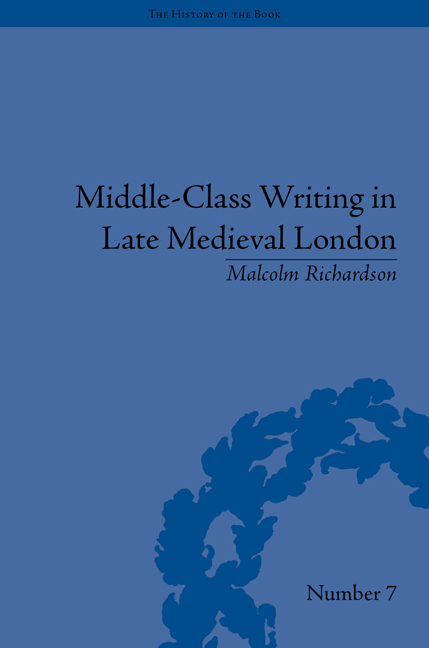Book contents
- Frontmatter
- CONTENTS
- Acknowledgements
- List of Abbreviations
- List of Tables
- Introduction: Pirates and Pens
- 1 London Middle-Class Writing: The Institutional Bases
- 2 ‘An Inextricable Labyrinth’: The Major Genres of Civic Life
- 3 English Middle-Class Writing in the Earlier Fifteenth Century: The Vernacular Letters
- 4 Women's Letters and Men's Books
- Conclusions and Speculations
- Notes
- Works Cited
- Index
4 - Women's Letters and Men's Books
- Frontmatter
- CONTENTS
- Acknowledgements
- List of Abbreviations
- List of Tables
- Introduction: Pirates and Pens
- 1 London Middle-Class Writing: The Institutional Bases
- 2 ‘An Inextricable Labyrinth’: The Major Genres of Civic Life
- 3 English Middle-Class Writing in the Earlier Fifteenth Century: The Vernacular Letters
- 4 Women's Letters and Men's Books
- Conclusions and Speculations
- Notes
- Works Cited
- Index
Summary
As we draw near the end of our period and of this book, it would be gratifying to conclude, trumpets sounding, with an awakened English middle-class consciousness flourishing on the written page. If I were writing sixty years ago, perhaps the ‘triumph of English’ would start confidently with Chaucer and move onward to William Porland's modest declaration of linguistic independence in his Brewers' book and towards truly compelling writing from some of these awakened merchants; English women similarly would reveal their confidential thoughts to friends in candid private letters. But such a picture would be more like that of merchant writing in Italy, not England, of the world of Giovanni Morelli and Margherita Datini rather than of Robert Chichele and the Celys.
While proclaiming a Writing Revolution for fifteenth-century England would be stretching the evidence thin, beneath the level of official writing – still highly Latin in administration and Anglo-Norman in law – middle-class writing habits had changed significantly by 1500, although an aged alderman in 1500 might be pardoned for thinking not much had changed since his boyhood in Chepe. Still, with the virtue of hindsight, this chapter looks at two notable changes in middle-class writing over the fifteenth century. First is the increase in the number of women who wrote, especially private letters; second is the privatization of the London custumal which manifested itself in the creation of home-made London custumals for some ordinary merchants and finally by the reconfiguration of the ‘London book’ to print with the appearance of Customs of London in 1503.
- Type
- Chapter
- Information
- Middle-Class Writing in Late Medieval London , pp. 143 - 170Publisher: Pickering & ChattoFirst published in: 2014



